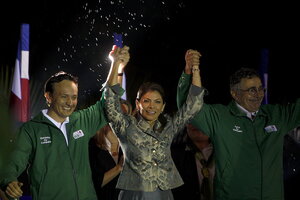Dipping 'pura vida'? Costa Ricans show lack of enthusiasm in run-up to February elections
According to polls, about 32 percent of Costa Rica's 3 million eligible voters say they plan to abstain from casting ballots due to corruption, lack of leadership, and high unemployment.

Laura Chinchilla, accompanied by fellow members of the National Liberation Party, greets supporters after being elected president of Costa Rica, Feb. 7, 2010.
Esteban Felix/AP/File
- Fulton T. Armstrong is a contributor to American University's Latin America blog at the Center for Latin American and Latino Studies.
The views expressed are the author's own.
Costa Rica is approaching February’s presidential and legislative elections with a distinct lack of enthusiasm, if not with dread.
Most international surveys present Costa Rica as the “world’s happiest country” (the Happy Planet Index), or in the elite club of the world’s “full democracies” (ahead of Japan and Belgium in The Economist’s list), or as the 48th least-corrupt country (out of 174 reviewed by Transparency International).
The economy is expected to grow about 3 percent this year, and the country’s access to foreign direct investment is blunting the impact of the government’s fiscal deficit of about 5 percent of GDP. Crime is on the rise, but Ticos know that their pain is small compared to that wreaked by the narcos and maras in Guatemala, El Salvador, and Honduras.
Reputable polls show, however, that Costa Ricans are gloomy about the state of their political institutions and specifically about their upcoming elections. According to polls, about 32 percent of the country’s 3 million eligible voters say they plan to abstain, citing corruption, a lack of leadership, insensitivity to the average citizen, and unemployment as reasons to reject not just the candidates but also the political elite in general.
The President of the Supreme Electoral Tribunal (TSE), Luis Antonio Sobrado, acknowledged last month that the election was taking place in the context of “citizen uneasiness … and a lot of anger with politics and politicians.”
Abstentionism was high in 2006 (35 percent) and 2010 (32 percent), but commentators sense a much deeper and darker alienation this time around. A columnist lamented that the “multiparty” system has been replaced by “atomization,” and another said the political parties have “disconnected themselves from the national reality.”
Further reflecting the malaise, President Laura Chinchilla’s support has nosedived – a July poll showed only 9 percent of voters said she was “good” and none said “very good” – and pundits cite her ineffectiveness as the cause of collapsed highways, dengue outbreaks, and other calamities.
The nominee of her Partido de Liberación Nacional (PLN), Johnny Araya, is widely thought to have an edge in February, but his 12 years as mayor of San José have coincided with a deterioration in the city’s infrastructure and security, and his personal lifestyle (including five marriages) may be a factor in popular skepticism. The government’s recent announcement that it will contract the services of 4,125 new employees in 2014, mostly in the education sector, drew immediate criticism as yet another example of political patronage to influence the race.
The self-doubt seems at this point indicative of concerns about President Chinchilla and the crop of candidates, rather than a rejection of democracy. Costa Ricans comparing themselves with the rest of Central America still feel good about themselves, and the green image that eco-tourists reinforce is comforting. But crumbling infrastructure – including collapsing bridges and the exorbitant cost of repeated repairs – and shocking crimes, such as the recent assassination of an environmentalist protecting turtles on a Caribbean beach, fuel the sort of doubts that only effective political and economic leadership can quell.

